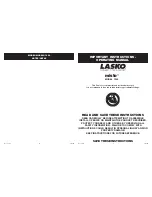
14
Installation and Operating Instructions
CHAPTER 8
CARE AND
MAINTENANCE
8.0
Care and maintenance
Safety instructions listed in Chapter 1.2 must be observed!
-
Prior to all work always ensure that the fan unit is isolated from the
power supply and secured against restarting!
-
In principle the devices are maintenance-free; the unit is not user
serviceable. Nevertheless all necessary maintenance work must be carried
out by qualified electricians!
-
Excessive deposits of dirt, dust, fats etc. on the impeller, motor, protective
grids and especially between housing and impeller are not allowed; as it can
lead to heavy imbalance in the impeller, overheat the motor or even block
the impeller. In those instances the device has to be cleaned.
-
In case of no longer use the unit must be serviced before operation.
Should be examined:
Secure mounting of the fan / replace if in doubt
Remove contaminant deposits
Mechanical damage, shut down the device, replace damage parts
Firm seating of bolt connections, loosen screws
Housing quality (cracks, brittleness of the plastic)
Overrunning of the impeller, the impeller doesn`t run freely, note
possible causes of failure in Chapter 8.1
Bearing noise
Vibrations – see Chapter 8.1
Power consumption according to the specifications on the type plate –
see Chapter 8.1
8.1
Decommissioning and disposal
Safety instructions listed in Chapter 1.2 should be observed!
During transportation safety instructions listed in Chapter 1.4 should be
observed.
Parts and components of the fan which have reached the end of their
lifespan, for instance because of the wear and tear, corrosion, mechanical
loading, fatigue and/or other effects that could not be directly discerned,
should be disposed in accordance with local and international laws and
regulations. The same applies to auxiliary materials such as oils, greases or
other substances. The conscious or unconscious re-use of used components
such as impellers, bearings, belts, etc. may endanger persons, the
environment as well as the equipment itself. Relevant local operating
regulations should be observed and applied.
DANGER
CAUTION
DANGER



































